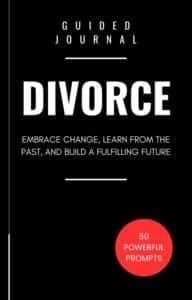Going through a divorce can be one of the most challenging experiences in life. It often brings a mix of emotions, from sadness and frustration to relief and hope for the future. As you navigate this significant life change, journaling can be a powerful tool to help you process your feelings, find clarity, and rebuild your sense of self. Writing about your experiences and emotions can offer a form of therapy, helping you to understand and accept what you’ve gone through and to make thoughtful decisions about your future.
This set of 50 journal prompts is specifically designed to guide you through the various stages of your post-divorce journey. These prompts will encourage you to reflect on your past relationship, deal with your present emotions, and plan for a fulfilling and exciting future. Whether you’re looking to find peace with what happened, rediscover who you are, or envision where you’re headed, these prompts can help you on your path to healing and personal growth.
Understanding Divorce
Divorce is a significant life event that can impact almost every aspect of your life—from your emotions and family relationships to your financial stability and future plans. In this guide, we’ll explore what divorce means, why it happens, and how it affects those involved.
What is Divorce?
Divorce is the legal process of ending a marriage. It officially dissolves the legal duties and responsibilities of the marital union under the rule of law of the particular country or state. Divorces can vary widely from one situation to another, reflecting the unique dynamics and challenges of each relationship.
Common Reasons for Divorce
People may choose to divorce for many reasons. Some of the most common include:
- Communication Problems: Constant misunderstandings or lack of communication can erode a marriage.
- Infidelity: When one partner has an affair, it can destroy the trust that the relationship was built on.
- Financial Issues: Differences in spending habits and financial stress can strain a marriage to breaking point.
- Constant Conflict: Frequent arguments and inability to resolve differences can lead couples to feel disconnected.
- Growth in Different Directions: Sometimes, couples grow apart or develop different goals and desires in life.
The Emotional Impact of Divorce
Divorce is often associated with a range of emotions, from sadness and anger to relief and hope. For example, Jane, a 45-year-old teacher, felt a mix of freedom and fear when she decided to divorce after years of unresolved conflicts with her spouse. While she looked forward to the opportunities to pursue her own interests, she also worried about the reactions of her children and friends.
Legal Aspects of Divorce
The process of divorce involves several legal steps. These typically include:
- Filing a Divorce Petition: One partner (the petitioner) files legal papers to start the divorce process.
- Financial Disclosures: Both partners disclose their financial information to ensure fair division of assets and debts.
- Child Custody and Support: If children are involved, decisions need to be made regarding who they will live with, visitation rights, and financial support.
Financial Consequences
Divorce often involves the division of assets and debts between the partners. This might mean selling a family home or dividing shared bank accounts. For instance, Michael, a 38-year-old graphic designer, had to adjust to a different standard of living after his divorce. He found himself needing to budget more carefully and make significant lifestyle changes.
Moving Forward After Divorce
Rebuilding after a divorce takes time and involves adjusting to a new normal. Many find it helpful to seek support from friends, family, or professionals such as counselors. Engaging in new activities, such as classes or hobbies, can also provide a positive focus.
Divorce marks the end of one chapter in life and the beginning of another. While it can be a time of emotional turmoil, it also offers an opportunity for personal growth and new beginnings. Understanding the process and impacts of divorce can help individuals navigate this challenging experience with greater awareness and preparedness. Remember, it’s okay to seek help and support from others as you move through this transition.

The Power of Journaling Through Divorce
Divorce can be one of the most emotionally challenging experiences you’ll encounter. As you navigate through this period of change and uncertainty, journaling can serve as a powerful tool to help manage your emotions, gain clarity, and rebuild your life. Let’s explore what journaling is and how it can specifically aid you during and after your divorce.
What is Journaling?
Journaling is the practice of writing down your thoughts, feelings, and experiences on a regular basis. It involves expressing oneself through words, which can be structured in various formats such as lists, letters, or freestyle entries. Journaling isn’t about grammar or spelling—it’s about capturing what’s going on in your mind and heart.
Emotional Relief and Self-Understanding
During a divorce, you might experience a whirlwind of emotions—from anger and sadness to relief and hope for the future. Journaling acts as a safe, private space where you can express these feelings without fear of judgment.
Clarifying Thoughts and Feelings: Sometimes, you may feel overwhelmed by conflicting emotions. Writing them down can help you sort through these thoughts and better understand what you are truly feeling. For example, if you write about your sadness daily, you may discover specific triggers that intensify this emotion, allowing you to address them more effectively.
Reducing Stress: The act of writing can be therapeutic. It allows you to release pent-up emotions, reducing stress and anxiety. The physical act of writing can also be meditative, helping to calm your mind.
Enhancing Decision-Making and Problem-Solving
Divorce involves making significant decisions that can affect your future, such as financial arrangements, living situations, and co-parenting details. Journaling can enhance your decision-making skills by:
Listing Pros and Cons: When facing decisions, writing down the pros and cons of each option can provide clarity and help you to weigh your choices more objectively.
Tracking Your Responses and Outcomes: Keeping a journal allows you to record and review your decisions and their outcomes. This can be particularly useful in learning what works best for you and your family, helping you make more informed decisions as you move forward.
Planning for the Future
Journaling can be a visionary tool, allowing you to script your desired future. After a divorce, you may need to redefine your goals and aspirations.
Setting Goals: Use your journal to outline your short-term and long-term goals. Writing down your goals increases your commitment to them and clarifies the steps needed to achieve them.
Visualizing Success: By describing your ideal future in your journal, you can start visualizing what you want to achieve. This practice not only boosts your motivation but also helps you identify the resources and changes needed to reach your goals.
Building Resilience and Personal Growth
Divorce can be a transformative period marked by personal growth and new beginnings. Journaling can foster resilience by helping you to:
Reflect on Lessons Learned: Regular entries about your experiences and challenges can help you identify important life lessons, contributing to personal growth.
Celebrate Achievements: In the midst of divorce, it’s easy to overlook your achievements. A journal can serve as a record of your successes, big or small, reinforcing your self-esteem and progress.
If you’re going through a divorce, consider taking up journaling as a method to cope with the emotional upheaval and to support your journey towards healing and rebuilding your life. It’s a simple practice that requires only a notebook and a few minutes each day, but it can profoundly impact your emotional well-being and help pave the way for a brighter future. Start today, and discover the transformative power of putting pen to paper.

Journal Writing Prompts for Divorce
- Reflect on the day you first met your former spouse. What hopes did you have for your future together?
- Describe a moment in your marriage where you felt truly loved.
- Write about a disagreement and what it taught you about communication.
- List three things you would tell someone about to get married, based on your own experiences.
- What were the initial signs that the relationship was changing?
- How has your perception of love and marriage changed since your separation?
- What emotions are you feeling today, and what can they teach you about your needs?
- Write about a time when you felt let down in your marriage. What support did you wish you had?
- What is a dream or goal you put aside for your relationship that you can now revive?
- List five qualities you now want in future relationships.
- Write a letter of forgiveness to your ex-spouse—whether you choose to send it or not.
- What are some ways you can start forgiving yourself for things you blame yourself for?
- Describe how you envision your ideal day now that you are single.
- What are the silver linings of your current life situation?
- Write about a tradition from your marriage that you would like to continue or modify for yourself.
- How can you use your current feelings to guide your decisions moving forward?
- What new hobby or interest would you like to explore now?
- Reflect on a piece of advice you wish you had received before getting married.
- Write a list of non-negotiables for your future relationships.
- What has been your biggest challenge during the divorce process, and how have you addressed it?
- Who has been your biggest supporter through this time, and what have they provided that has been most helpful?
- Describe a day recently that was particularly hard. What made it tough, and how did you cope?
- What does self-care look like to you now?
- Reflect on your independence and what it means to you today.
- What are some goals you have for this year that excite you?
- List three things you’ve learned about yourself from the divorce.
- What are you most proud of achieving since your separation?
- How do you handle feelings of loneliness when they arise?
- What are three daily or weekly rituals that bring you comfort or joy?
- How can you be more compassionate towards yourself during tough days?
- What is one thing you miss about being married, and how can you compensate for that loss in other ways?
- Imagine a conversation with your future self, five years from now. What would they tell you?
- What new traditions do you want to start this year?
- How have your friendships or other relationships changed since your divorce?
- What does healing look like to you, and how are you actively pursuing it?
- Write about a moment when you felt a strong sense of closure from your past relationship.
- What are the key strengths that have helped you navigate through your divorce?
- How can you strengthen your support network to better support you moving forward?
- Reflect on a compliment you received recently. How did it make you feel?
- What are some constructive ways you can manage stress during this transitional period?
- List three places you’d like to visit now that you’re starting a new chapter in your life.
- What have been the most helpful resources (books, articles, therapies, etc.) during your divorce?
- How do you feel about dating again, and what steps do you feel you need to take to be ready?
- What has this change taught you about resilience?
- Describe a perfect day in your new life.
- How can you more fully embrace the changes that have come with your divorce?
- What is something you’ve always wanted to do but never had the time or opportunity for before now?
- How has your routine changed, and what new routine would you like to establish?
- Write a letter to your future partner, describing who you are at this stage of your life.
- Reflect on how you’ve grown since the beginning of the divorce process and celebrate your progress.
These prompts are designed to inspire introspection, growth, and empowerment during the transformative journey of post-divorce life.
Download Printable Journal Prompts (PDF) >>
Guided Journal for Navigating Divorce
50 Writing Prompts to Embrace Change, Learn From the Past, and Build a Fulfilling Future

Navigating through the upheaval of a divorce can feel like traversing uncharted waters. “The Guided Journal for Navigating Divorce” offers a beacon of support and reflection to help you reclaim your emotional well-being and envision your future with clarity and hope. This guided journal is designed not only as a tool for healing but as your personal space for growth and discovery during one of life’s most challenging transitions.
Dive Deep into Your Personal Experience
Insightful Prompts: Each of the 50 carefully crafted prompts in this journal guides you through a reflective journey of your past relationship, current emotions, and future aspirations. From remembering the day you first met your former spouse to envisioning a conversation with your future self, these prompts encourage deep exploration of your emotional landscape and personal evolution.
- Reflect on the initial signs that your relationship was changing and what you’ve learned from them.
- Explore the emotions you feel today and what they reveal about your inner needs.
- Revisit cherished memories and consider what aspects of past traditions you might want to retain or adapt.
A Tool for Healing and Growth
Therapeutic Writing: Writing can be an immensely therapeutic process, providing a release and helping to sort through complex feelings. This journal is your safe haven where you can:
- Pour out frustrations in a non-judgmental space.
- Celebrate small victories on your journey toward healing.
- Articulate fears about the future and transform them into actionable plans.
Self-Discovery and Empowerment: As you fill out each page, you’ll discover strengths you never knew you had and reassess your values and needs in the light of your new life circumstances.
- Identify your core strengths that have helped you navigate through your divorce.
- List new hobbies or interests you want to explore that reflect your true self.
- Write a letter to your future partner, sharing the insights you’ve gained about who you are now.
Plan Your Path Forward
Goal Setting and Future Planning: With prompts designed to help you outline your goals, this journal acts as a blueprint for rebuilding your life.
- Map out the steps towards achieving new dreams, such as travel or career changes.
- Develop new routines and traditions that celebrate your independence and new beginnings.
- Reflect on and plan how you’ll strengthen your support network to thrive in the next chapter of your life.
Your Companion on the Road to Renewal
Whether you’re in the midst of the storm or navigating the aftermath of divorce, this guided journal offers structured support to help you process your experiences and move forward with resilience and optimism. Every prompt is a step towards embracing change, learning from the past, and building a fulfilling future.
Join thousands who have found solace and empowerment in the pages of this journal. Your path to renewal begins with the turn of a page.
As you come to the end of these 50 journal prompts, remember that healing from divorce is a process that involves patience, self-compassion, and time. Each entry you’ve written has helped you peel back layers of emotion and confusion, bringing you closer to understanding your true self and what you need to move forward. Keep using these prompts as a way to check in with yourself, to recognize and celebrate your growth, and to continue addressing challenges as they arise. Journaling isn’t just about recording thoughts—it’s a dynamic tool that can foster resilience, inspire change, and create a new vision for your life after divorce. Embrace this journey with an open heart and mind, and let your journal be a safe space where you can continue to grow, reflect, and heal.

